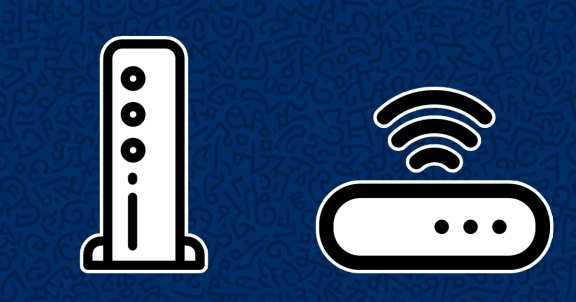Internet 101: Difference Between A Modem and A Router?

Navigating the world of home networking can be complex, especially with terms like modems and routers frequently popping up. These devices play pivotal roles in delivering Internet to our homes but serve very different purposes. To clarify the "router vs modem" debate, let’s break down what each device is and the roles they have in keeping us connected.
What is a Modem?
At the heart of any home Internet setup is the modem. The term "modem" is an abbreviation for "modulator-demodulator." It modulates (converts) digital data from your Internet service provider (ISP) into signals for transmission over telephone lines, cable systems, or satellite links and demodulates (reconverts) incoming signals back into digital data that your devices can use.
Think of it as translating data from the Internet into a language that your devices understand and vice versa. This translation process is crucial because it allows your devices to access the Internet. Without a modem, connecting to the online world would not be possible.
What is a Router?
If the modem is the gate to the Internet, the router is the orange/yellow vest-wearing traffic director within your home network. It distributes the Internet connection from your modem to your various devices, like laptops, smartphones, and smart TVs. The router manages and directs data across your home network, ensuring information reaches the intended device.
Beyond distributing Internet access, routers also create a local area network (LAN), enabling devices within your home to communicate with each other directly (e.g., sending a document from your computer to your printer) without using the Internet. They also include security features, like firewalls, to protect your home network from external threats.
Can a Router and Modem be Combined?
The simple answer to this question is yes—modem-router combos exist and they are called gateways. These devices combine the modem and router into a single piece of equipment, often housed within the same case or box. This design can sometimes lead to confusion as it blurs the lines between the two different functions.
While modem-router combos, or gateways, offer convenience, opting for separate devices often provides distinct advantages like easier upgrades, ensuring your network can keep pace with advancements in technology and changes in your connectivity needs. For instance, a separate router like SmartNet allows users the flexibility to upgrade to the latest in WiFi router technology independently of their modem.
Router vs Modem: The Key Differences
Understanding the differences between a modem and a router is essential for setting up a home network. Here's a simplified breakdown:
- Functionality: A modem connects your home to the Internet, translating data back and forth between your ISP and your devices. A router distributes this Internet connection to various devices and facilitates their communication with each other.
- Connection Type: Modems link to the Internet via a cable from your ISP (using technologies like coaxial cable, fiber, or DSL). Routers connect to modems using an Ethernet cable to share the Internet connection among your devices.
- Network Creation: Routers are responsible for creating a local network, allowing your devices to interact without needing to access the wider internet.
- Wireless Capability: Modern routers often provide Wi-Fi, enabling devices to connect to the internet wirelessly. Modems, by themselves, do not offer wireless connectivity; this requires a router.
By distinguishing the roles of modems and routers, setting up and troubleshooting your home network becomes much simpler.
How do you tell if your Modem or Router is the Problem? What does Resetting a Router Do? What does Resetting a Modem Do?
When you reset your router, you're essentially giving it a fresh start. This process can help resolve issues like slow internet speeds, intermittent connectivity, or problems connecting new devices to your network. Resetting Your Router is best when:
- You're experiencing issues with devices connecting to your WiFi.
- You need to clear a network bottleneck affecting wireless speeds.
- You're setting up or reconfiguring your home network.
When you reset your modem, you're clearing its memory and re-establishing the connection to your Internet Service Provider (ISP). This can be particularly useful if you're experiencing issues with internet access itself, rather than problems with individual devices connecting to your network. Resetting Your Modem is best when:
- You cannot access the internet across multiple devices.
- You've been advised by your ISP to do so during troubleshooting.
- You're experiencing consistent slow or unreliable internet access.
Buckeye Broadband: Enhancing Your Internet Journey
Recognizing that the world of home networking might seem daunting, Buckeye Broadband is here to simplify your Internet experience. We offer top-notch Internet services, including the latest modems and routers, to ensure you have a reliable and fast connection.
Whether it's for streaming, remote work, or online gaming, Buckeye Broadband provides the tools and support you need for a seamless online experience. Have questions about setting up your network or choosing the right devices? Our expert team is ready to assist. Visit Buckeye Broadband to discover how we can elevate your home Internet setup.
